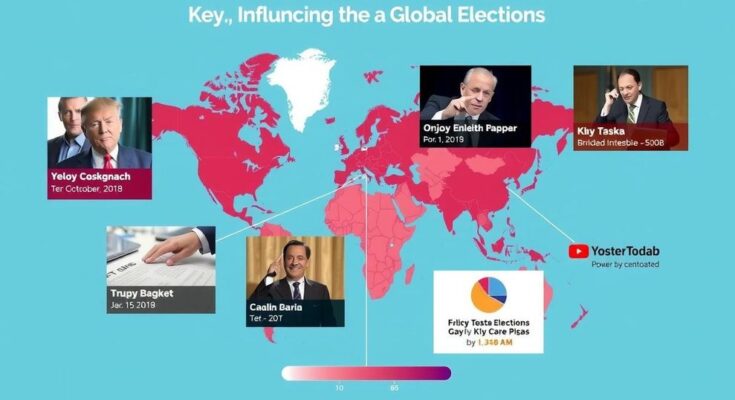In 2024, approximately four billion people voted globally, leading to significant political changes. Donald Trump made a dramatic comeback in the U.S., while India saw Modi’s party lose seats, resulting in a coalition government. Europe experienced political turmoil with the rise of far-right parties and governmental collapses. In Latin America, Mexico elected its first female president amid controversies, and Venezuela faced unrest after a contested election. South Africa’s ANC lost its parliamentary majority for the first time, challenging its longstanding dominance.
In 2024, approximately four billion individuals, representing around half of the global population, participated in pivotal elections marking a historic engagement in democratic processes worldwide. Notably, in South Africa and India, ruling parties faced diminishing support due to accusations of corruption and democratic backsliding. Simultaneously, European nations experienced a rise in far-right parties, while France and Germany encountered governmental collapses. The most significant political comeback was that of Donald Trump in the United States, who was re-elected amidst a climate of economic discontent and anti-immigration sentiment.
As the year concluded, various elections stood out as influencers on international geopolitics. In the United States, Donald Trump’s re-election on November 5 exemplified a remarkable political resurgence after contesting the 2020 election results and facing numerous legal challenges. Trump’s campaign succeeded by appealing to economically discontented voters, particularly those without college degrees. This outcome allowed Republicans to gain narrow control over Congress, potentially facilitating the implementation of Trump’s policies.
In India, despite initial expectations of a decisive victory for Prime Minister Narendra Modi, his party faced a loss of seats, obliging him to establish a coalition government. Many observers perceived this outcome as a triumph for democracy given Modi’s authoritarian inclinations. The coalition risked obstructing controversial legislative initiatives, especially as Modi continued to pursue a nuanced foreign policy balancing relationships with both Western powers and Russia.
Indonesia’s election of Prabowo Subianto, marked by allegations of irregularities, indicated a shift towards a more personable leadership style, essential for attracting foreign investment. Nevertheless, Prabowo’s pro-China posture may pose complications for the incoming Trump administration’s strategy against Chinese regional ambitions.
In Europe, France’s political landscape underwent turbulence after President Macron called for a snap election, leading to a fragmented parliament. The ensuing chaos has hindered governmental effectiveness, crucial for addressing national debt and broader European security concerns. This instability, alongside Germany’s caretaker government, poses a challenge for EU solidarity, particularly regarding support for Ukraine.
The United Kingdom witnessed a shift in power when the Labour Party ended 14 years of Conservative governance amid historically low voter turnout. However, Prime Minister Keir Starmer’s lack of popularity presents a significant hurdle, as the nation grapples with social service strains and migration concerns, necessitating robust solutions beyond echoing previous Conservative policies.
In Latin America, Mexico saw Claudia Sheinbaum rise as the first female and Jewish president, continuing her predecessor’s leftist agenda amidst controversies regarding judicial independence. Meanwhile, Venezuela faced ongoing unrest following Nicolás Maduro’s arguably illegitimate re-election, worsening the country’s economic collapse.
Finally, South Africa’s African National Congress, historically dominant, lost its parliamentary majority, forcing the formation of a coalition government. Although some progress was noted post-election, substantial challenges such as poverty and unemployment remain pressing issues for President Cyril Ramaphosa’s administration.
The elections of 2024 are significant milestones in democratic participation globally, with billions casting their votes in various countries. These elections reflect shifting political landscapes influenced by economic conditions, governance issues, and emerging far-right movements in Europe. The re-election of prominent leaders, such as Donald Trump, alongside the rise and falls of others, set the stage for future international relations and domestic policies, highlighting the interconnectedness of these events across continents.
The elections of 2024 marked an unprecedented year in global democracy, with significant implications for international geopolitics. Ruling parties faced challenges amidst public discontent, resulting in an evolving political spectrum across several nations. The outcomes, from Donald Trump’s comeback to shifts in leadership in countries like India and France, embody the changing dynamics of governance and citizen engagement in democratic processes. As countries navigate these transitions, the potential for future alliances and conflicts hinges on the political decisions made in this pivotal period.
Original Source: www.semafor.com




